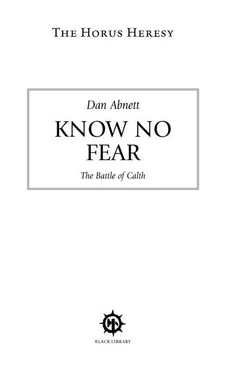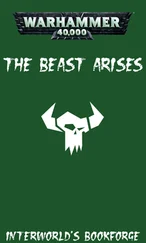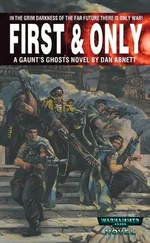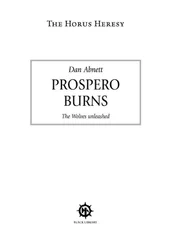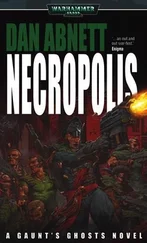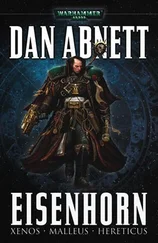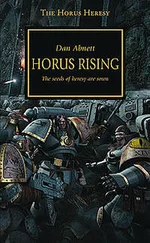‘Get the men up,’ Phrastorex yells.
The vox is screwed up. Weird sounds spit and cough through his helmet every time Phrastorex tries to open a link. Is that screaming?
Is that… chanting?
‘Get the men up and ready!’ he repeats, and then starts to pound across the clearing to the areas marked out for the 111th. Ekritus needs to get his men moving too. Something’s going on. Phrastorex hasn’t felt an intuitive wince this bad since the firefight on Cavolotus V. Ekritus needs to get ready for whatever this turns out to be.
A strange wind is stirring the trees, making them swish. The wind’s warm, dry. It feels like something bad has exhaled.
‘Ekritus!’ Phrastorex yells.
Down on the plains below the woods, even the Word Bearers are rousing. Phrastorex can see them forming up. He can see their Army units assembling. That’s good. Damn good. Far better drill than he expected of the XVII, given their reputation as heathen berserkers. Far faster response.
Good. Good, then. They’re all standing ready, ready to face this. United as one. It gladdens his heart.
They can face this together, whatever this is.
[mark: -0.18.30]
The datashock kills Server Uhl Kehal Hesst.
It doesn’t kill him instantly the way it kills forty-six of the data moderati in the cogitation wells around him, but it bursts and fries key sections of his cerebral architecture. This is brain damage that cannot be repaired, and from which he will never recover. Synaptic junctions are burned out like faulty wiring. A brain-bleed begins in his frontal lobe.
He remains standing.
Light hits the orbital Watchtower at Kalkas Fortalice a nanosecond after the shockwave of data. The noosphere collapses like an ice sculpture in an oven. The tower’s manifold field stutters out. Hesst feels and absorbs the shared agony of several thousand deaths: his modified brethren aboard the primary shipyard, aboard docked vessels, in the tower around him. Some deaths are quick: flashes of annihilation. Others, still fast, are physically traumatic: the liquid spatter of compression, the explosive misery of decompression, the blunt fury of impact, the screaming hell of immolation.
Some deaths are slower. They take whole parts of seconds to end. The plugged men and women in the amniotic armourglas caskets around him reel as hammer blows of data assault their brains. Information overload. Sensory overload. Hypertraumatic inload syndrome.
He is almost relieved when the noosphere fails.
He sways. The windows of the tower have automatically tinted to reduce the flare of the orbital explosions. Hesst’s permanent MIU link burns like a white-hot wire through his soul. His entire bioengineered self is fatally compromised.
Only one thought, captured in simple binaric form, remains within his grasp.
Hesst surrendered discretionary mode four hundred and sixty-two minutes ago. He surrendered it to the orbital bioengines.
The bioengines, all the orbital automatics, have died.
Calth’s planetary weapons grid has just ceased to function.
[mark: -0.18.30]
Telemechrus wakes again. He wakes bolt upright awake, screaming awake, howling awake, as if from a nightmare. There’s cold sweat on his back, but he doesn’t have a back. There’s blood in his mouth, but he doesn’t have a mouth. His eyes are open, but he doesn’t have eyes.
A flash-flood of data has shocked him into ignition, shocked him so hard that for a moment he is given a physical memory of his life before transformation. Not his recent transformation. From before that, from before his formative transformation by biogenetic engineering to Space Marine. For a second he was granted a memory of waking from a nightmare as an unmodified human being.
As a child.
He realises it wasn’t just a data shock. There was a significant physical shock too. His casket has been violently disturbed, thrown, dropped.
His implant clock tells him that he has been dormant for a little over nine hours and ten minutes. External sensors are down. He can’t see. He can’t open the casket. There is no noosphere. There is no data inload.
His own sensors, the cyberorganic sensors of his combat chassis mount, tell him the external temperature of the casket is over five thousand degrees Celsius. His inertial locators tell him that he is upside down and falling.
At terminal velocity.
[mark: -0.18.30]
The sky erupts. Criol Fowst clutches his athame so tightly against his breast that the blade draws blood from his fingers.
Staring up at the firestorm that is devouring the sky, the Brotherhood of the Knife starts to chant the litany of the Octed.
Ushkul Thu! Ushkul Thu!
Fowst wants to join in, but he is too busy laughing, laughing uncontrollably, like a maniac.
[mark: -0.18.30]
Erebus looks up from the circle of black stones. The centre of the ritual circle, where the bodies of many of the Tzenvar Kaul processionals lie smouldering or twitching, has not been a focused reality for almost ten minutes. Matter squirms there. The membrane of the universe has turned liquid. There’s a smell like the smell of weird dreams, strong but not in any way identifiable.
Essember Zote of the Gal Vorbak mutters something as the first flash hits the southern skies. Erebus is already watching. Fire, light, first light, a dawn of sorts. Erebus understands that several clear strategic benefits will be achieved by their plan, but they are all military objectives and they count little to him. To the first of the Dark Apostles, it is the meaning that matters: the significance, the art, the context.
The light in the sky, that huge bright flare they have wrought upon this day, that is the Ushkul Thu. In the archaic language of the Holy Worlds, the words mean ‘Offering Sun’ or ‘Tribute Star’. It is hard to translate it precisely. There is a sense of sacrifice, a sense of the promise represented by dawn, and the sense of something greater to follow.
There is a greater sunrise to come.
[mark: -0.18.20]
Calth Veridian Anchor, the vast shipyard, is ablaze and dying. Damaged beyond the possibility of salvation or stabilisation, its giant platform structure is tipping, shredding, pulsing like a white dwarf star that has suddenly been placed in Calth’s orbit.
It is an energy fire, a nuclear fire, spherical and incandescent, throbbing. The nearby orbital platforms shiver at the series of shockwaves thumping out of the stricken orbital. Some have taken collateral damage from outflung superstructure debris or parts of exploding ships, and are now burning or holed. Along the anchorage line, ships of the fleet are combusting or crippled. Debris and ejecta continue to tumble from the underside of the foundering orbital, caught by Calth’s gravity.
It is chaos. Electromagnetic slams have crippled communication networks, and what little vox and pict remains is choked with frantic intership traffic: questions, demands, entreaties, insistences. What has happened? What is happening? You will tell me immediately what is happening!
There is no information, no data. The Mechanicum’s throat is cut, its voice-box torn out, its brain mush. The only facts are those available to anyone with eyes, or a window port, or a functioning picter. An act of unimaginable violence has been perpetrated. Calth high anchor is a firestorm. The death toll is huge. The injury to the fleet and the yard infrastructure is unthinkable.
It is an attack. It can only be an attack. An act of war. No accident could have been so far-reaching in its effect. The Veridian system and its approaches are protected by scrupulous systems of check and countercheck, by peerless levels of redundant security. This magnitude of catastrophic damage would have required malice in order to achieve it: a deliberate and inimical intent to circumvent the secure cordon.
Читать дальше
